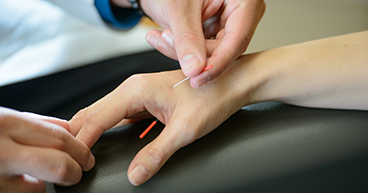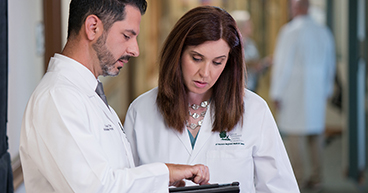


185 Posts

December 19, 2017
Coping with grief during the holidaysAttempting to deal with the upcoming holidays while coping with grief can feel daunting, but there are a few ways to prepare yourself.

November 14, 2017
Using integrative therapies to help manage side effects of cancer treatmentWhen you’ve been diagnosed with cancer, it’s natural to feel as if you have little control over your health, and many patients are willing to try anything to rid their body of cancer.

October 31, 2017
Doctor finds common ground for art and science—in humanityOn the corner of art and science, an intersection where disparate crafts commonly collide, you'll find Mashiul Chowdhury, MD, Director of Infectious Disease Control at Cancer Treatment Centers of America® (CTCA).

October 26, 2017
What foods and drinks are linked to cancer?With so much information coming at you, determining fact from fiction may be difficult when it comes to what foods and drinks are linked to cancer.

October 5, 2017
Who should care for cancer patients after treatment, PCPs or oncologists? Both, experts sayThe cancer journey is a challenging, emotional experience, and many patients find themselves forming deep bonds with their oncologist. So when treatment is over, and it's time to go back to their primary care physician, some patients have a difficult time letting anyone else take the reins of their care.

September 21, 2017
What you need to know about gynecologic cancers: They're not as rare as you may thinkIt may be hard to believe today, but in the 1980s, the public knew little about breast cancer, how it forms and how it’s treated. But thanks to annual Breast Cancer Awareness efforts launched every October, when the country is awash in pink ribbons, many women are better informed about how they may reduce their risk for developing the disease, and what they should do to screen for it. But gynecological cancers get little of that public attention

September 19, 2017
Hearing loss: The little-known side effect of some chemotherapy drugsPatients may not associate hearing loss with cancer treatment, but for many, the side effect is all too real. Read more.

September 14, 2017
Nutrition may not help the immune system fight cancer, but it is still importantSome patients believe that changing their diet—say, by swapping out their daily bag of chips for an apple—will strengthen their immune system and help it battle cancer. But they’re only partly correct. Read more.

September 12, 2017
Surgeon draws on music to find the rhythm of medicineFor Dr. Steven Standiford, the rhythm resonates from two disparate sources: music and medicine.
Guidelines
The information contained in this blog is not intended nor implied to be a substitute for professional medical advice. Always seek the advice of your physician or other qualified health provider prior to starting any new treatment or with any questions you may have regarding a medical condition. Nothing contained in the blog is intended to be used for medical diagnosis or treatment of any illness, condition or disease.